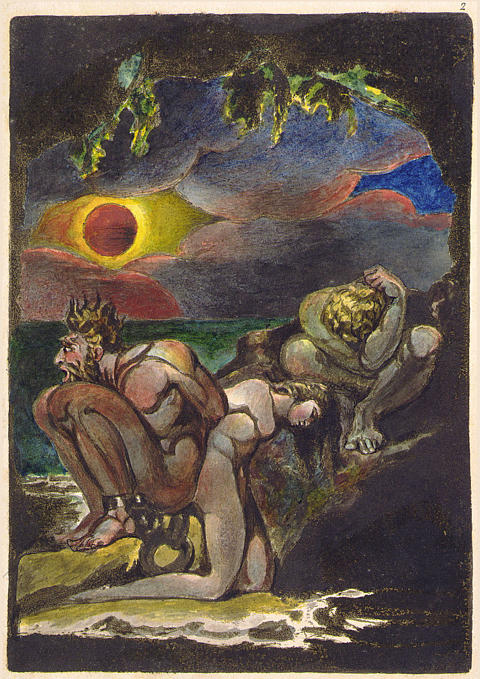In some ways adolescence is considered unique to our culture; that's certainly true for the present form of adolescence (in our culture).
1. Blake was interested in the form of adolescence of his day; in fact he participated in it whole-heartedly like he did everything else that he did. The MHH may or may not have been written (or at least originated) in his own adolescence. More likely it was an expression of what his own adolescence meant to him, a violent rejection of conventionality in all its forms.
 |
| Visions of the Daugherers of Albion |
Visions of the Daughters of Albion also shows a 'violent rejection of conventionality', particularly conventional marriage.
Few people I know had a level of intellect comparable to Blake's: Jesus would be foremost (We might see his adolescence as his initial wilderness experience). It was an intellect devoted to goodness and without the common flaws that color and corrupt the intellect of most of us.
2. Northrup Frye was (in my mind) a candidate for that august category. 25 years ago I was beginning a serious interest in 'our poet' When I first read Fearful Symmetry, it was terribly obscure, but I found it compelling. After five readings I was convinced that William Blake was 'the way to go' for me. Now, after many years, I looked at it again.
Frye's vocabulary is awesome: on the first reading of Fearful Symmetry you may find a terrible obscurity, but that's due to the fact that Frye used words that you may not be familiar with. So hindsight shows that if I had spent more time reading it, I might have eventualy gotten the meaning of concepts that are still very cloudy in my mind: I simply lacked the author's vocabulary-- a very simple criterion of intellect, but an important one.
Frye's archetypal adolescence involved leaving his study of religion for the study of literature.
3. Some peculiar adolescences are found in various forms of science fiction: note C.S.Lewis' the Narnian series, Madeleine Engle's stories and Arthur C Clarke's Childhood's End, which celebrates the growing change in the intellect of our children. Parents today are mystified at what their children are about, where they are-- all too often lost to them. Clarke was predicting the foreigness of the adolescence of the day he envisioned.
4. Colin Dexter, a man whose intellect places him very high in my mind, had significant things to say about the adolescence of his day. He had had a relationship with Oxford, and he perceived it as a citadel of conventionality, convention going bad, so to speak. He took part in translating his written work to videos; one of the many that focused on adolescence is Cherubim and Seraphim.
5. Some of the American Indians's culture included sending the adolescent our into the wilderness, were he (so to speak) loses his innocence. Indian Guides emulates this custom (to varying degrees), but a more radical 'Indian related' activity is the Order of the Arrow.
6. Military training ('Boot Camp') is a time honored way that a great many of our younger generation become 'mature' (at least in the military sense).
7. The archetypal adolescence has perhaps the most vivid impact on the experience of elderly people with their grandchildren.
(More to come!)
No comments:
Post a Comment